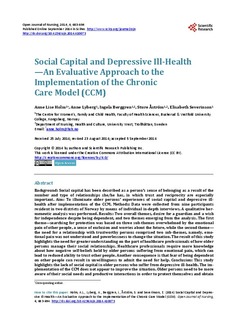| dc.contributor.author | Holm, Anne Lise | |
| dc.contributor.author | Lyberg, Anne | |
| dc.contributor.author | Berggren, Ingela | |
| dc.contributor.author | Åström, Sture | |
| dc.contributor.author | Severinsson, Elisabeth | |
| dc.date.accessioned | 2014-09-29T16:18:00Z | |
| dc.date.accessioned | 2014-12-08T14:41:10Z | |
| dc.date.available | 2014-09-29T16:18:00Z | |
| dc.date.available | 2014-12-08T14:41:10Z | |
| dc.date.issued | 2014 | |
| dc.identifier.citation | Holm, A. L., Lyberg, A., Berggren, I., Åström, S., & Severinsson, E. (2014). Social Capital and Depressive Ill-Health - An Evaluative Approach to the Implementation of the Chronic Care Model (CCM). Open Journal of Nursing 4(10), 683-694 | nb_NO |
| dc.identifier.issn | 2162-5344 | |
| dc.identifier.uri | http://hdl.handle.net/11250/226831 | |
| dc.description | This is a copy of the publisher’s PDF originally published in Open Journal of Nursing, and self-archived in this institutional repository in accordance with publisher's policy. | en |
| dc.description.abstract | Background: Social capital has been described as a person’s sense of belonging as a result of the number and type of relationships she/he has, in which trust and reciprocity are especially important. Aim: To illuminate older persons’ experiences of social capital and depressive ill-health after implementation of the CCM. Methods: Data were collected from nine participants resident in two districts of Norway by means of individual in-depth interviews. A qualitative hermeneutic analysis was performed. Results: Two overall themes, desire for a guardian and a wish for independence despite being dependent, and two themes emerging from the analysis. The first theme—searching for protection was based on three sub-themes overwhelmed by the emotional pain of other people, a sense of exclusion and worries about the future, while the second theme—the need for a relationship with trustworthy persons comprised two sub-themes, namely, emotional pain was not understood and powerlessness to change the situation. The result of this study highlights the need for greater understanding on the part of healthcare professionals of how older persons manage their social relationships. Healthcare professionals require more knowledge about how negative self-beliefs held by older persons suffering from emotional pain, which can lead to reduced ability to trust other people. Another consequence is that fear of being dependent on other people can result in unwillingness to admit the need for help. Conclusion: This study highlights the lack of social capital in older persons who suffer from depressive ill-health. The implementation of the CCM does not appear to improve the situation. Older persons need to be more aware of their social needs and productive interactions in order to protect themselves and obtain support from their social network. | en |
| dc.language.iso | eng | nb_NO |
| dc.publisher | Scientific Research Publishing | en |
| dc.rights | Navngivelse-Ikkekommersiell-IngenBearbeidelse 3.0 Norge | * |
| dc.rights.uri | http://creativecommons.org/licenses/by-nc-nd/3.0/no/ | * |
| dc.title | Social Capital and Depressive Ill-Health - An evaluative Approach to the Implementation of the Chronic Care Model (CCM) | nb_NO |
| dc.type | Journal article | nb_NO |
| dc.type | Peer reviewed | nb_NO |
| dc.date.updated | 2014-09-29T16:18:01Z | |
| dc.subject.nsi | VDP::Medical disciplines: 700::Health sciences: 800::Health service and health administration research: 806 | nb_NO |
| dc.source.volume | 4 | |
| dc.source.journal | Open Journal of Nursing | en |
| dc.source.issue | 10 | |
| dc.identifier.doi | 10.4236/ojn.2014.410073 | |
| dc.identifier.cristin | 1154189 | |

